CiM – Care in Movement
Empowering communities to provide care by combining smart technology and personal assistance to maintain mobility.
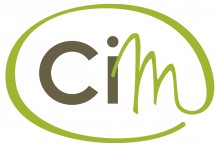
The CareInMovement (CIM) project is developing a system that can be used to provide support for caregivers throughout Europe. The system combines two complementary approaches: On the one hand, volunteers and family members are to be better integrated and supported in the caregiving process, in order to be able to respond to eventual care deficits. The system thereby offers various functions to support the caregiving process (e.g. standardized communication and task management) and to motivate volunteers (e.g. a time bank account). On the other hand, the system offers individual exercise programs for people in need of nursing care. Their level of health should thereby be maintained or, in the best case scenario, even improved in order for them to remain self-sufficient and independent for as long as possible.
More information about the project
Project
CareInMovement – Empowering communities to care by combining smart technology and personal help to maintain mobility
CiM innovates the way we think about care of the elderly by involving allmembers of a care network and additionally empowering volunteers to care with the use of advanced ICT: we involve formal and informal carers as well as the elderly persons and we give incentives to each group – to make a contribution towards better quality of life for all parties involved. This includes a report system for informal carers, better synchronization between formal and informal carers; and training as well as motivational incentives for elderly people suffering from diseases of the circulatory or the musculoskeletal system and their informal carers. To these people, we offer services and applications to motivate them to do more exercise and thus, improve their general health.
Details
Overview
Europe faces the problem of not only having an aging population, but also a decreasing group of formal carers. CareInMovement (CiM) tackles this challenge and innovates the way we think about care of the elderly by using advanced ICT. On the one hand, it aims at increasing the number of carers and building up a sustainable care community by mobilizing and empowering volunteers and family carers. And on the other hand, it supports the care recipients’ side to prolong independent living by maintaining the current health status through enhancing everyday life activities by proposing individually tailored motion activities.
Implementation
The CiM approach is technologically supported by two complementary services: ‘a virtual motion coach’ and a ‘virtual empowerment coach’. The ‘virtual motion coach’ enhances everyday life activities with individual exercises and training challenges for the elderly. It aims to empower older people with chronic health conditions to monitor their own abilities. The ‘virtual empowerment coach’ facilitates and improves collaboration between formal and informal carers. It realizes information exchange between carers by using common nursing language adapted to informal care and provides education opportunities. CiM will be tested within two care regimes in Austria and Italy for 8 consecutive months with at care recipients, family members, volunteers and formal carers in each country. Additionally, a control group in each country will be established. To reach high usability and technology acceptance, so called ‘lead users’ are recruited in the beginning of the project. They are involved in all project phases e.g. gathering user requirements, development of training concepts, user interface design and field trial preparation.
Expected Results and Impact
CiM involves its users in meaningful activities that contribute to improve their personal health conditions. Vitality and physical well-being may be enhanced and ideally CiM positively impacts on people’s mental well-being as well. The extension of care communities by the integration of volunteers relieves family carers. They are able to better manage stress and reduce the negative impact of care activities. Further CiM enables social care organizations to organize care more effectively and efficiently. The roadmap for market launch will be implemented within one year after project end.
Duration of the project
1/10/2015 – 30/9/2018
Scenario
Marianne H. (72, widowed) lives in her own house in Fusch, a small village in the mountains of Salzburg near the Großglockner. Her daughter Michaela (48, married, one child just finishing school, employed) lives in the neighbour village and visits her once or twice a week. Since many years Marianne is suffering from congestive heart failure associated with shortness in breath. Due to her illness she does very little physical exercise and now she is also overweight. Her family doctor knows that at her age, Marianne needs to do more than just changing her diet, therefore he always encourages her to do physical exercises, e.g. at least to go for regular walks in order to mobilize her and to prevent her from suffering a thrombosis. Marianne needs help with personal hygiene and monitoring of medication, and thus has contracted five hours home care per week from the Hilfswerk (one of the main care providers in Austria). Before, her neighbours Hans and Anna Z. took over some responsibilities and helped her with gardening and cleaning the house. However, they were worried to take on care responsibilities due to being afraid to provide inappropriate help.
Despite the deterioration of her health status her family doctor still insists that she should engage in more physical activities. One day, he tells Marianne that a new service called ‘CiM’ is available on the market which she could use as „virtual assistant“ to conduct individually tailored physical activities on a regular basis while staying in touch with her local community. The service is based on personal devices called “tablet” and “fitness tracker”. First, Marianne has doubts wearing such a device but she decides to test it because the system offers the possibility that her neighbours receive a special training (‘CiM-education service’) in order to be able to assist her. Marianne also finds out that her granddaughter is thinking about becoming a nurse and she therefore participates taking Marianne for walks. According to her training plans, Marianne has to go for a walk with her granddaughter every other day for at least 25 minutes. At the beginning she is frustrated. But after three weeks she realises that she is again able to do daily activities that she was unable to achieve before. After two months she has already lost five kilograms and can now reduce care time of the Hilfswerk – also helped by the fact that her neighbours are now able to help her again. She says that she would never want to miss the system as it gives her positive feedback, needs-tailored training plans (‘CiM-motivation and motion promotion service’), enabled her to go to church alone again. Her progress pleases her family doctor and her neighbours.
Evaluation Reports
Carimo Evaluation Reports
- Design of the CARIMO field trial and survey data collection
- Design of online surveys for older adults
- Usability of CARIMO over time – the perspective of home care service users
- Usability of CARIMO – the perspectives of the members of the care network
- Effects of CARIMO
- Timebanks in Austria (in German only)
CARIMO
CARIMO is the technical implementation of the CiM-System. CARIMO is mainly used on the tablet. Additionally a fitness tracker can be used to monitor own activities.
Tablet Application
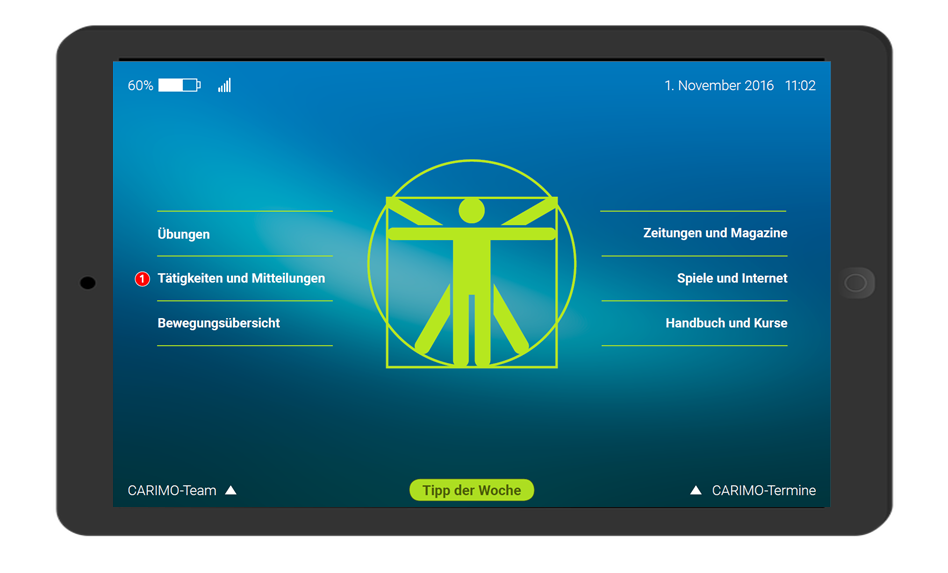
Exercises
The motion promotion service provides individual, health-enhancing physical exervises focusing on motor skills.
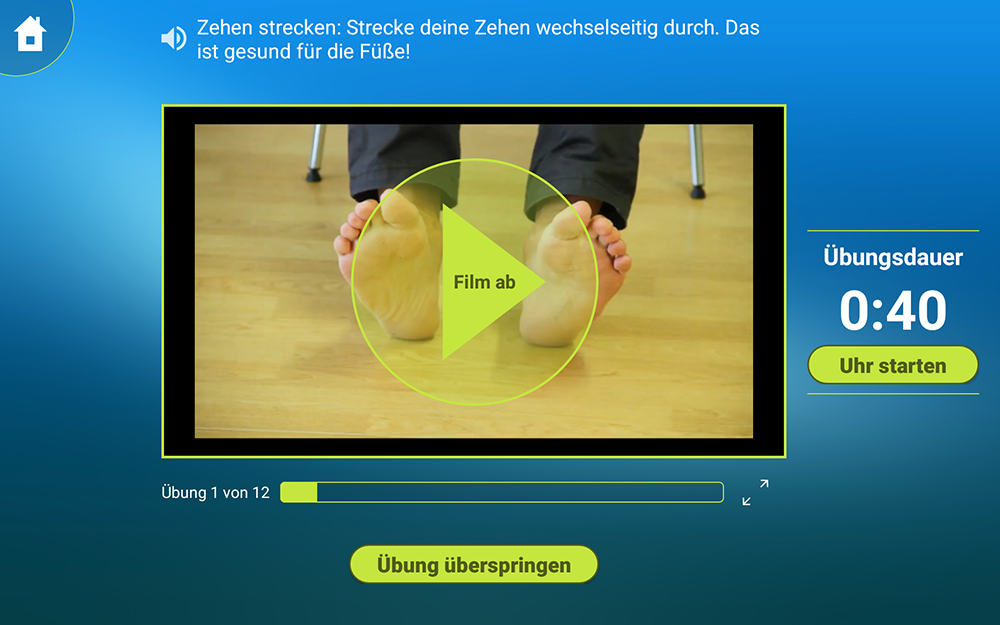
Overview
The activity overview shows the fitness progress which includes
performed exercises and everyday activities. Rewards are shown if
person’s aims are achieved. Detail view by touching the circles.
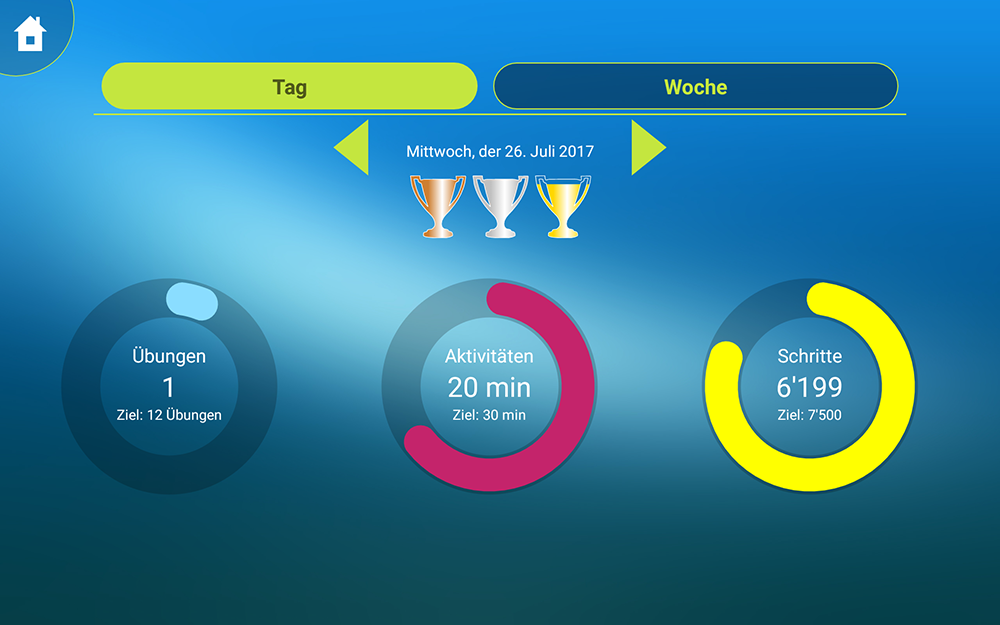
Tasks and messages
The collaboration service offers task lists for the users and carers to
document activities. For successful collaboration between informal and
formal carers, it provides a messaging service.
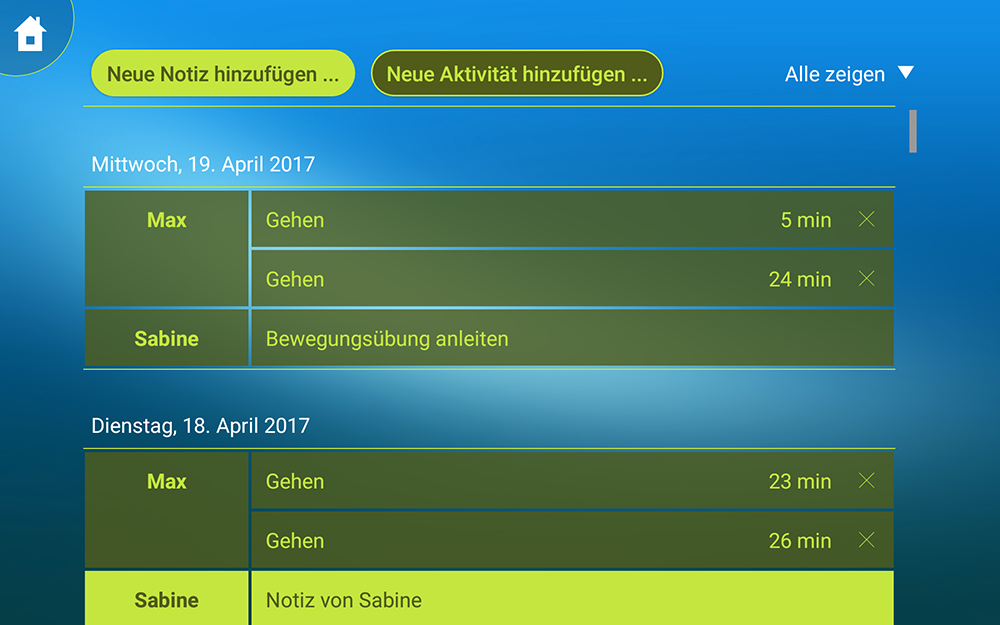
Newspapers and journals
The tablet offers regional news and magazines.
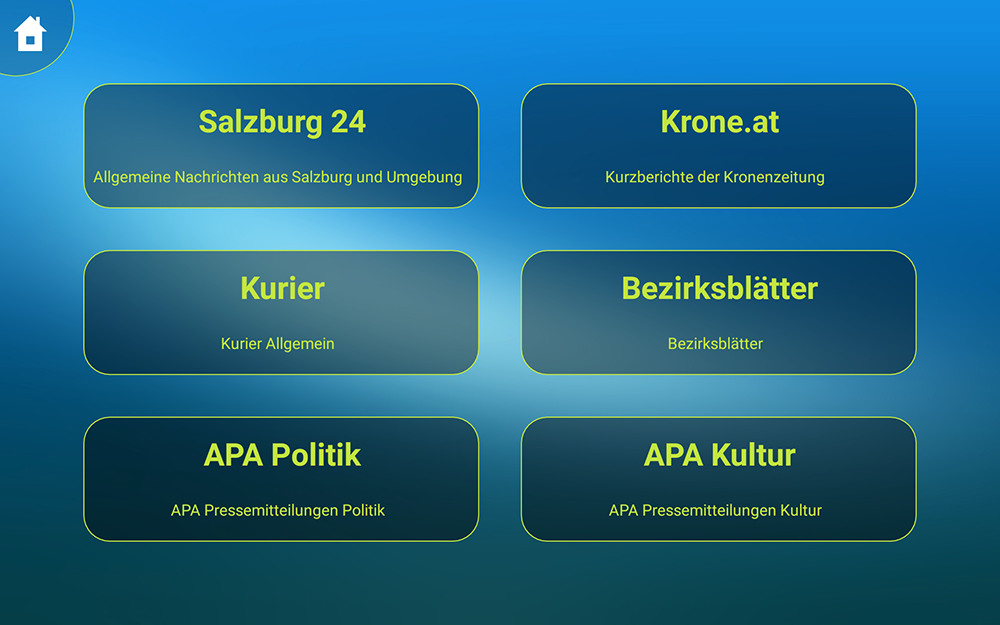
Games and internet
Additionally the system provides games and access to the internet.
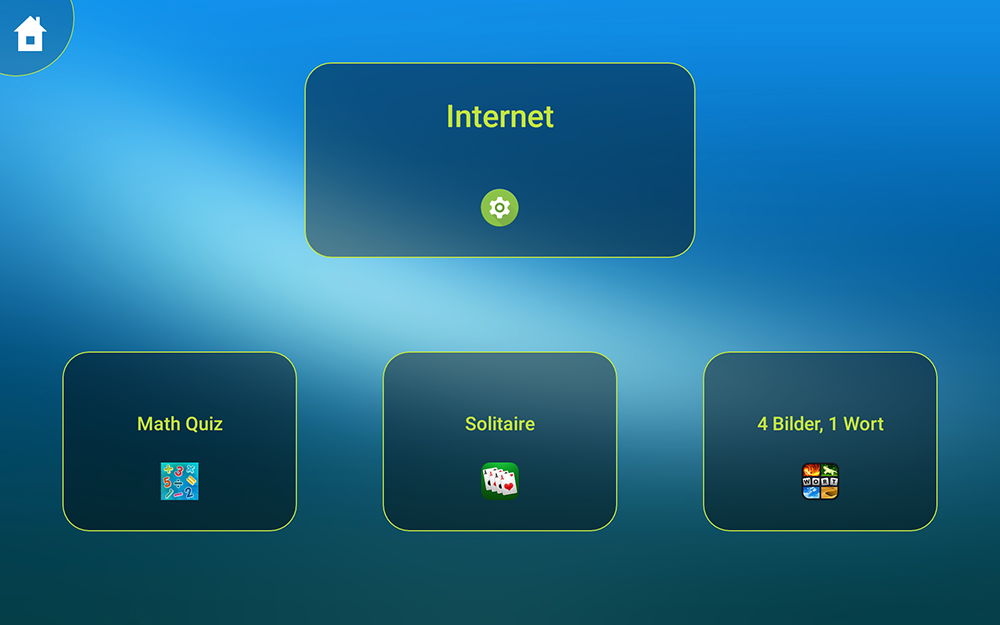
Manual and courses
The education service bases on actual courses presented by formal
carers. It offers education material to review the course contents. For
carers this service provides information about important care issues
e.g. how to mobilize care recipients.
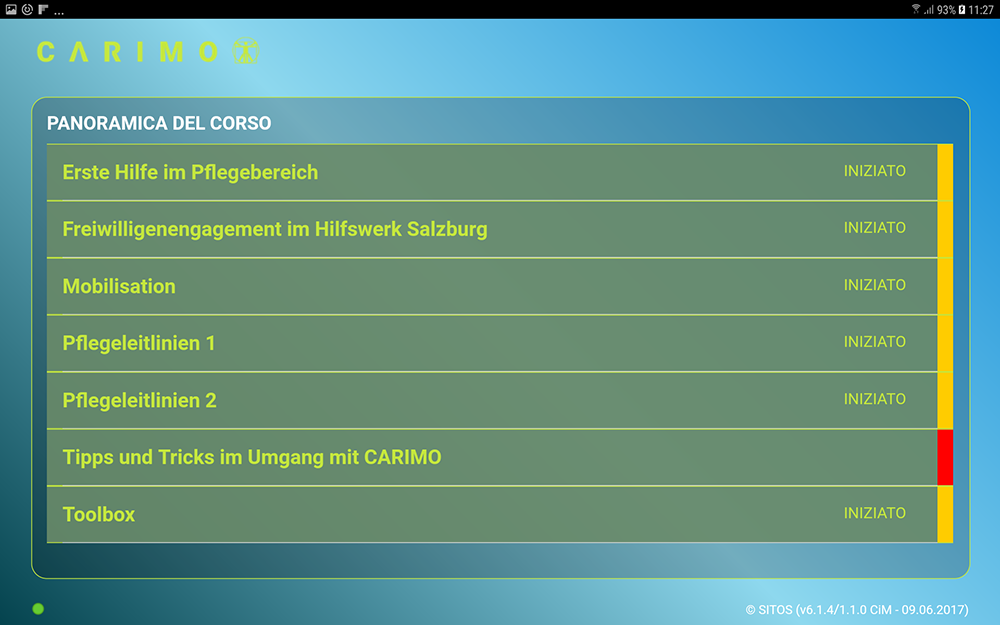
Tips
The system provides every week a new tip how the end user can maintain his and hers agiltiy, strength and fitness.
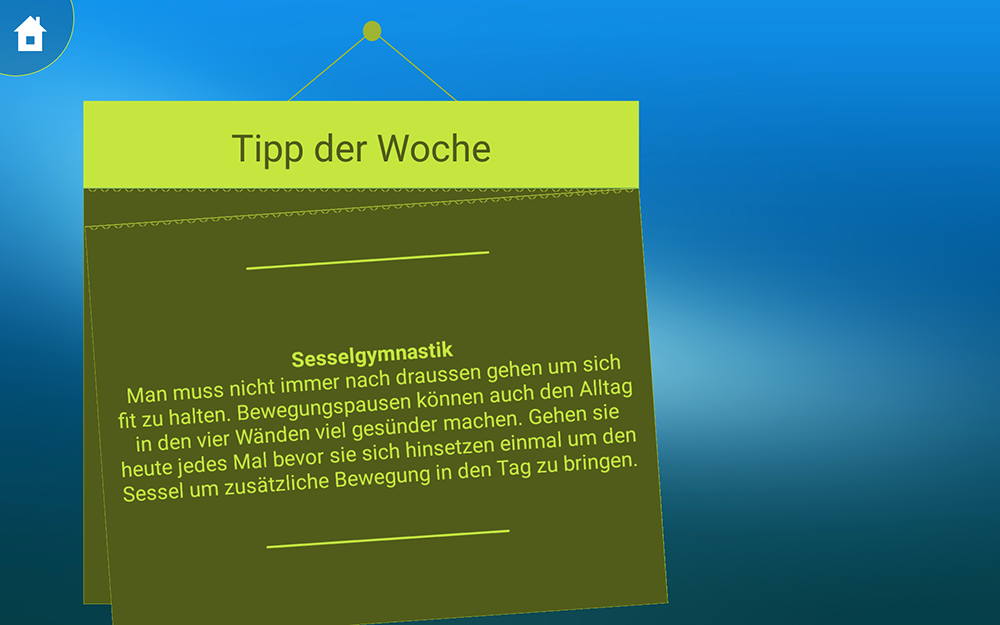
Appointments
The community service manages meetings of the primary end-users with their care givers.
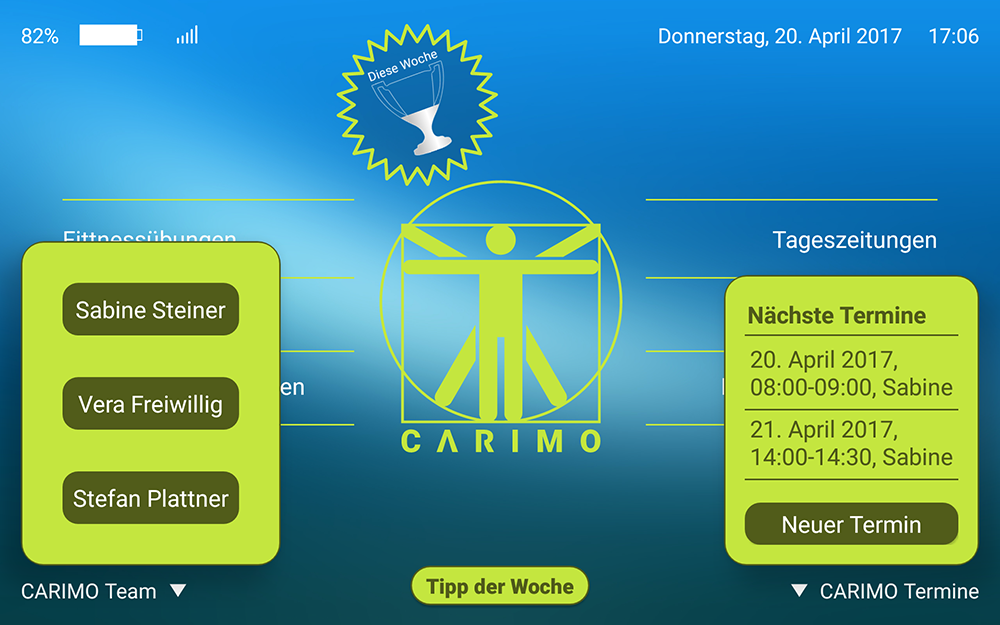
Login
If caregivers are logged-in, they can report the tasks and activities they performed during their visit at the end users home.
Tracker Solution
Additionally a fitness tracker can be used to monitor own activities.
The fitness tracker recors everyday activities. It shows walked steps, millage and burned calories.

Further, it is possible to record walked distances e.g. walks, hikes and runnings. Then, the user is able to watch the routes on the map overview of tablet.
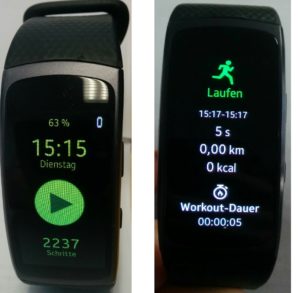
Web Portal
The Web Portal is mainly used by caregivers, volunteers, assistants and mentors. It enables them to get in touch with the end user or each other.
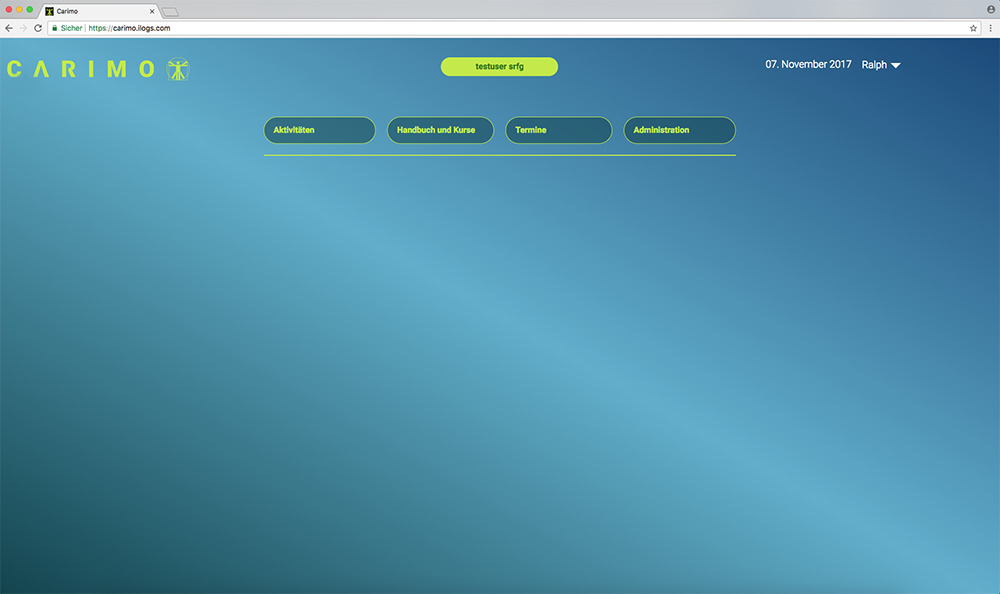
Tasks and messages
As on the tablet, the collaboration service offers task lists for the carers to document activities.
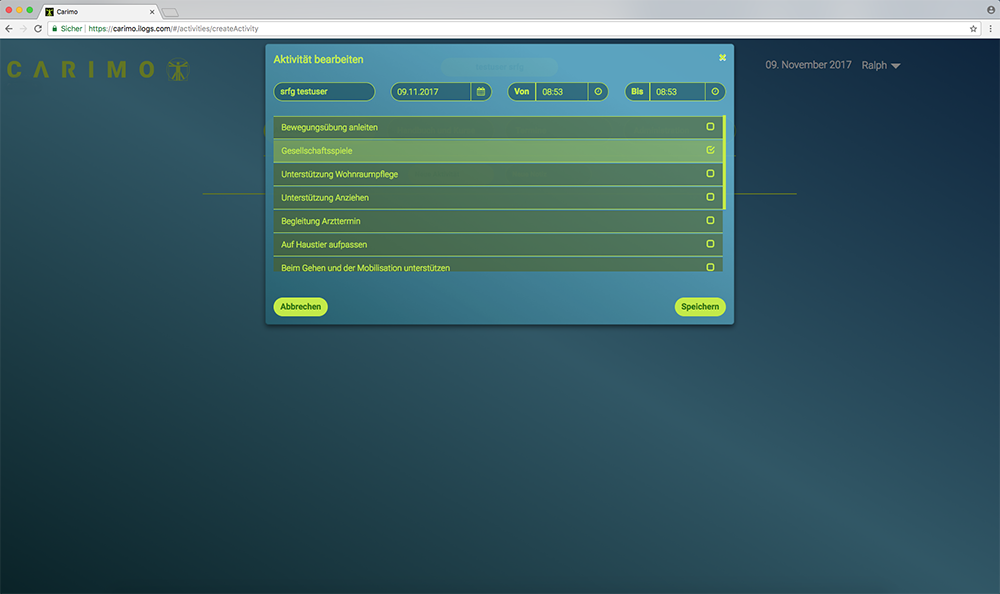
The community can read about the progress on the web portal or on the tablet.
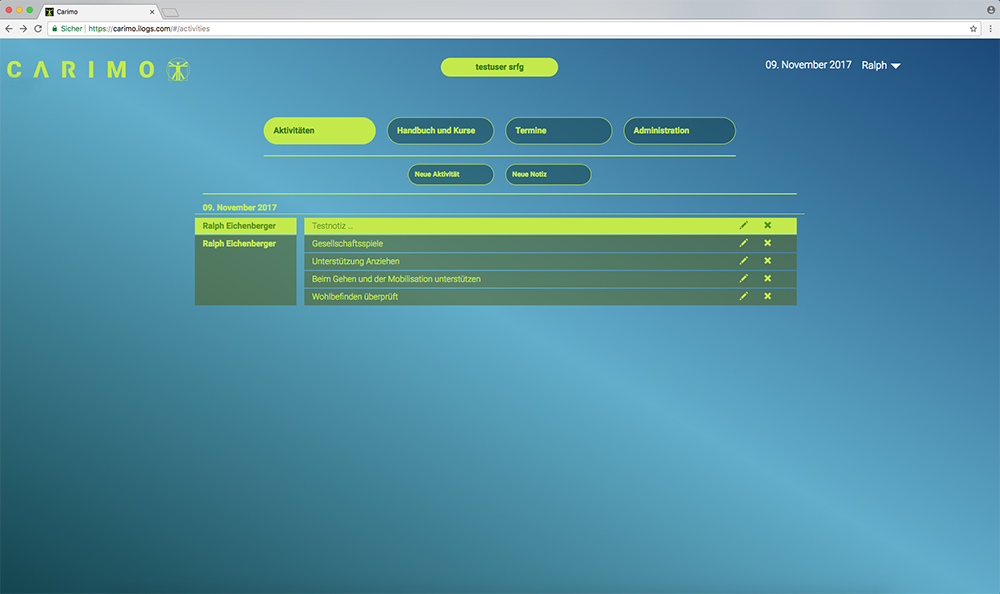
And it is also possible to leave notes for each other. It is indicated on the tablet if somebody documented anything or a message is left.
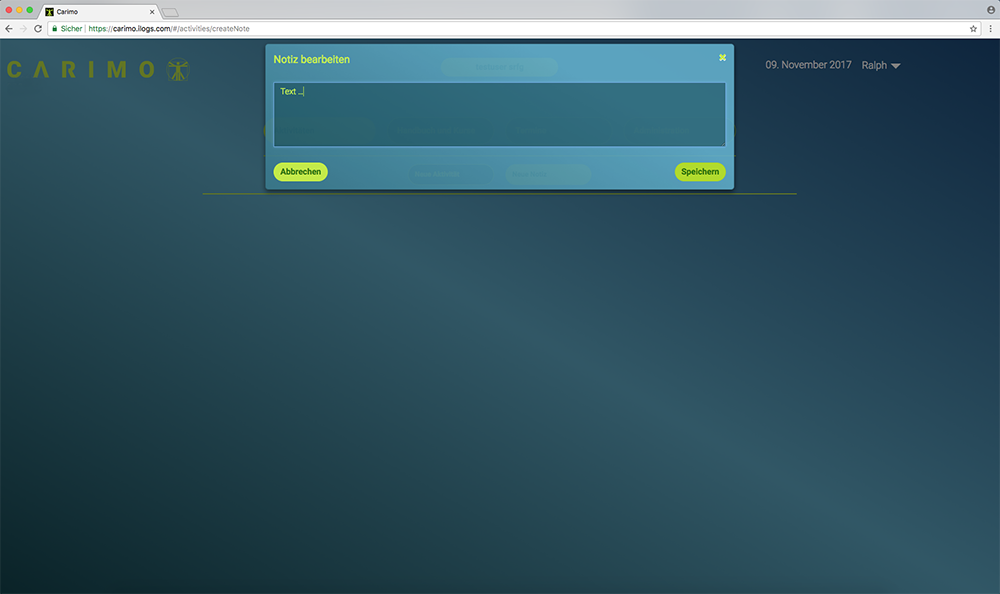
Manual and courses
The education service bases on actual courses presented by formal carers. It offers education material to review the course contents. For carers this service provides information about important care issues e.g. how to mobilize care recipients.
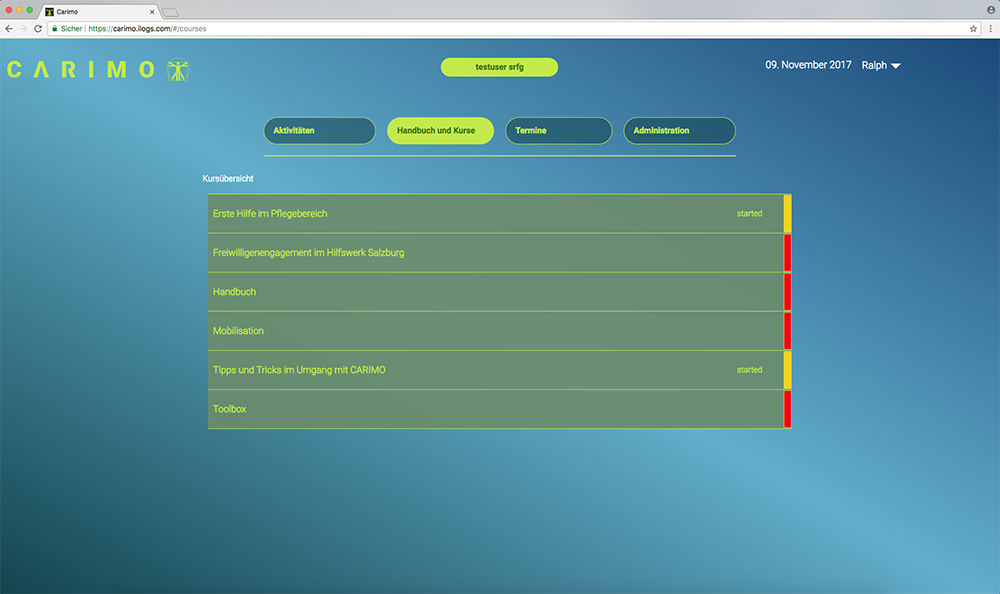
Appointments
Appointments of the primary end-users with their care givers can also be managed on the web portal. The end-user is notified about new appointments.
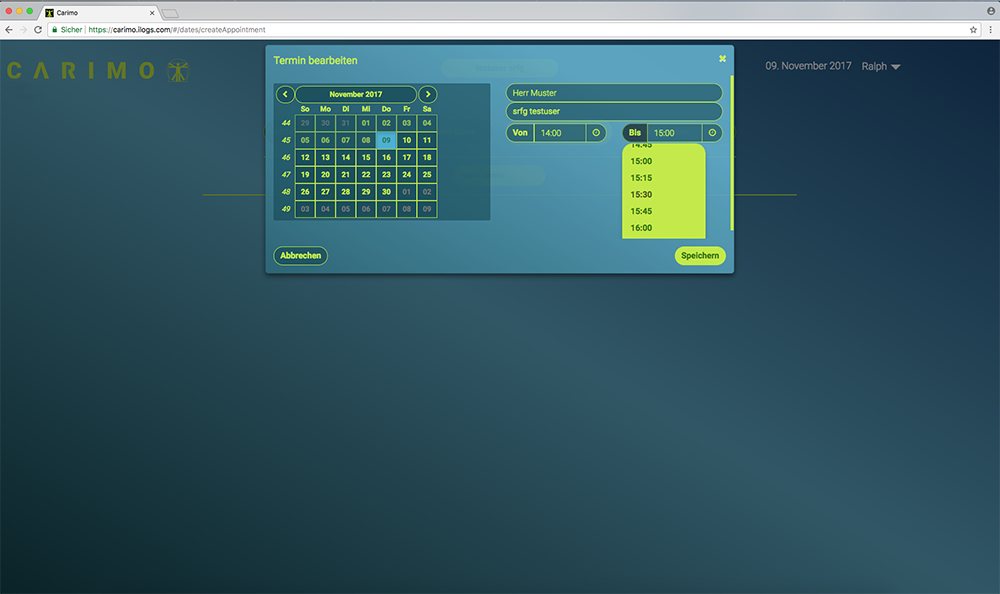
Volunteer service
Volunteers can create reports about their activities on the web portal.
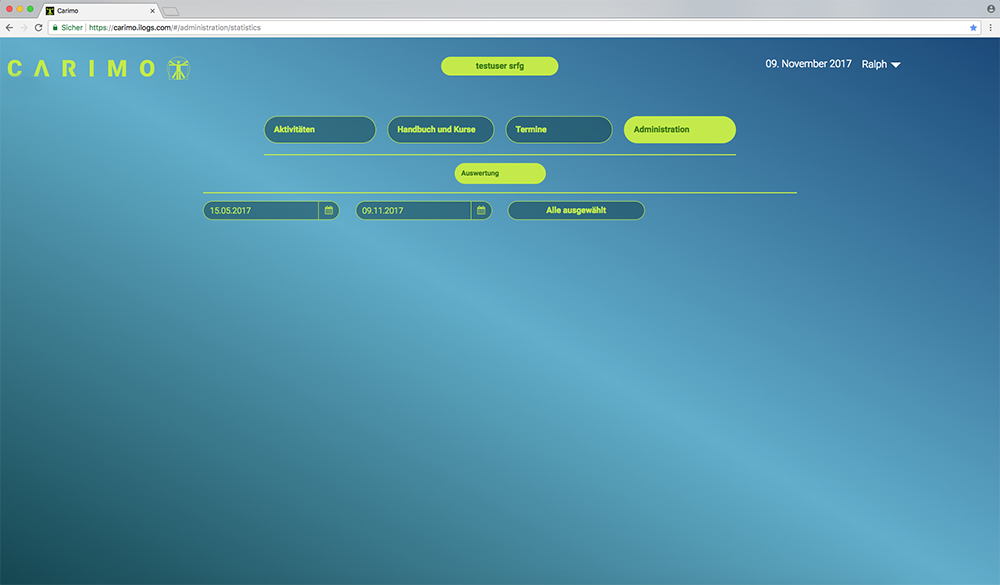
Field Trials
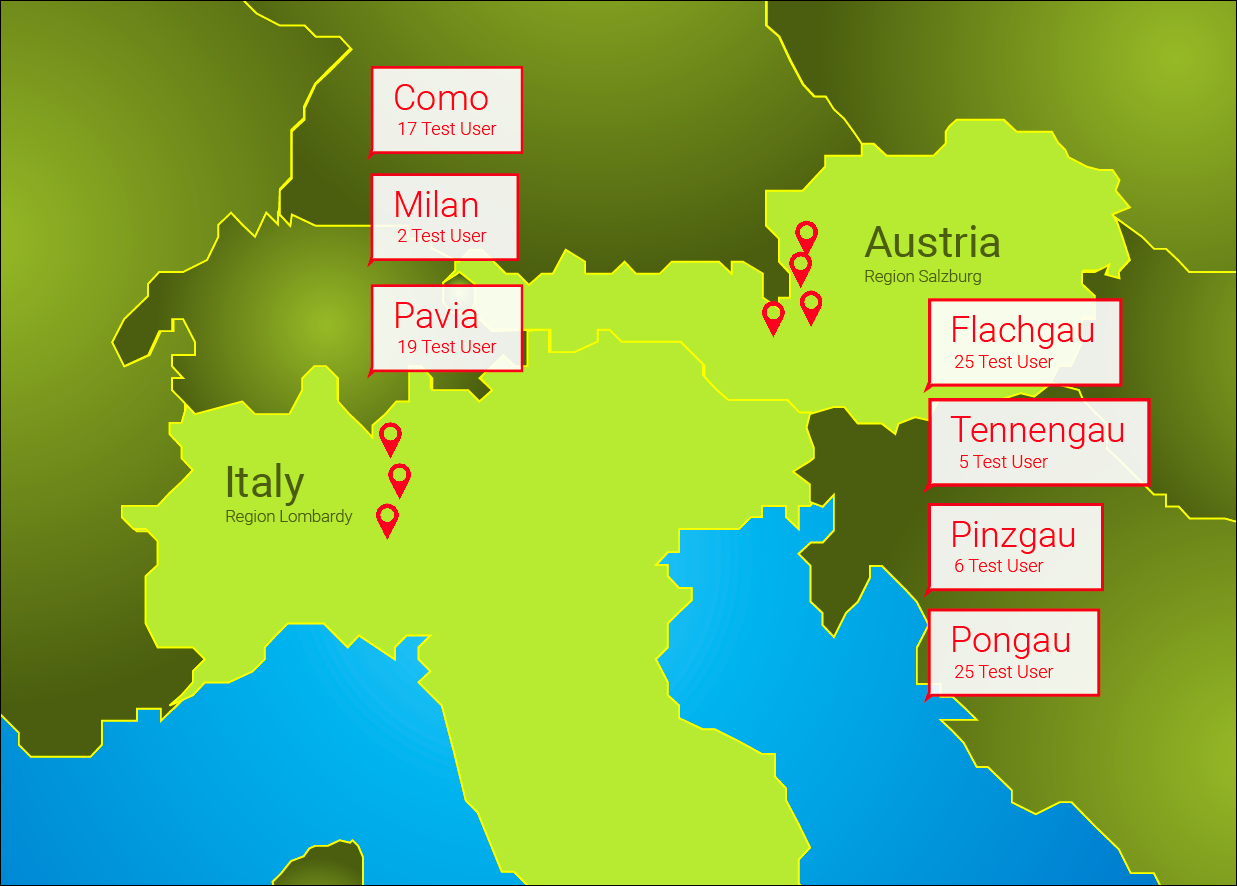
Field Trial Austria
15th June 2017 – 28th February 2018
Test Group
55 clients of a social care organisation (Hilfswerk Salzburg), their family carers, care workers and volunteers
Field Trial Italy
1st July 2017 – 28th February 2018
Test Group
34 clients of a social care organisation (ALDIA and others), their family carers, care workers and volunteers.
The evaluation of the CiM-project comprises a usability analysis, the analysis of actual use of the CARIMO-system and an impact analysis.
- Usability analysis: online-questionnaires to end users (clients), their relatives, professional carer workers and volunteers; personal interviews with relatives
- Analysis of actual use: automatic usage data logging of all user groups
- Impact analysis: three questionnaires and three surveys of functional fitness per client of test and control group (end user) (before, during and at the end of the trial phase)
Video Clips
Impressions from the Field Trials: Mobility and Cooperation
Impressions from the Field Trials: Fitness Exercises and Fun
Mit dem Klick auf das Bild werden durch den mit uns gemeinsam Verantwortlichen Youtube (Google Ireland Limited) das Video abgespielt, auf Ihrem PC Skripte geladen sowie personenbezogene Daten erfasst.
Impressions from the Field Trials: Community and Motivation
Mit dem Klick auf das Bild werden durch den mit uns gemeinsam Verantwortlichen Youtube (Google Ireland Limited) das Video abgespielt, auf Ihrem PC Skripte geladen sowie personenbezogene Daten erfasst.




